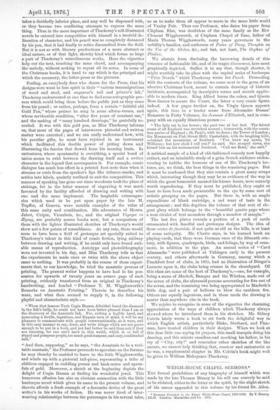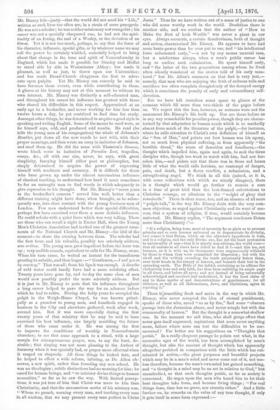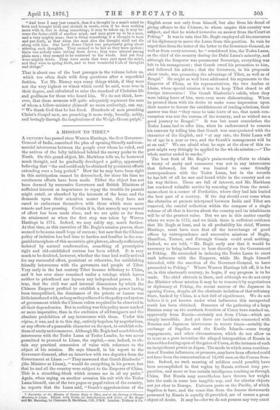WEIGH-HOUSE CHAPEL SERMONS.*
THE formal prohibition of any biography of himself which was made by the late Thomas Binney in his will can scarcely be said. to be violated, either in the letter or the spirit, by the slight sketch of his career appended to this volume by his friend Dr. Allon.
a Sermons Preached in the King's Weigh-House Chapel, 1829-1869. By T.Bbanoy LL.D. London: Macmillan and Co. 1876. Mr. Binney felt—justly—that the world did not need his "Life," written as such lives too often are, in a strain of mere panegyric. lie was not a scholar; he was neither missionary not evangelist ; his career was not a specially chequered one, he had not the spiri- tuality of an Irving, the zeal of a Wesley, or the devotion of an -Owen. Yet it is not too much, perhaps, to say that the force of his character, influence, special gifts, or by whatever name we may call the power he certainly wielded, materially helped to bring about that change in the tone and spirit of Nonconformity in England, which has made it possible for Stanley and Moffat =to stand side by side in Westminster Abbey ; has made it pleasant, as well as just, to throw open our Universities ; .and has made Broad-Church clergymen the first to advo- cate open pulpits. Yet Mr. Binney can scarcely be said to have foreseen these events, even while contributing to them. A glance at his history may not at this moment be without its own interest. Mr. Binney was distinctly a self-educated man, and throughout his career his influence was greatest with those who shared his difficulties in this respect. Apprenticed at an early age to a bookseller, and never working for him less than twelve hours a day, he yet contrived to find time for study. Amongst other things, he was determined to acquire a good style in speaking and writing English. Some of the means he used were, as he himself says, odd, and produced odd results. He read (he tells the young men of his congregation) the whole of Johnson's Rambler, put down all the new words he met with, with their ,proper meanings, and then wrote an essay in imitation of Johnson, and used them up. He did the same with Thomson's Seasons, wrote blank verse in imitation of Paradise Lost, tragedies, essays, &c., all with one aim, never, he says, with great simplicity, fancying himself either poet or philosopher, but .simply determined to acquire the power of expressing himself with readiness and accuracy. It is difficult for those who have grown up under the almost unconscious influence of classical teaching, to understand how hard it must sometimes be for an untaught man to find words in which adequately to give expression to his thought. But Mr. Binney's "seven years in the bookseller's concern " served him well, better than a different training might have done, when brought, as he subse- quently was, into close contact with the young business men of London. Few men understood better their special difficulties, perhaps few have exercised over them a more definite influence. He could rebuke with a quiet force which was very telling. There are those who can recall a night in Exeter Hall, when the Young Men's Christian Association had invited one of the greatest orna- ments of the National Church and Mr. Binney—the idol of the moment—to share the evening between them. The scholar had the first hour, and his valuable, possibly too scholarly address, was written. The young men grew impatient before the hour was up ; very audible sounds, equivalent to calls for Mr. Binney, arose. When his turn came, he waited an instant for the tumultuous greeting to subside, and then began :—" Gentlemen, —I call you so -by courtesy." That was all; from his lips it was enough. A douche of cold water could hardly have had a more subduing effect. 'Twenty years have gone by, and to-day the same class of men would now possibly prefer the more scholarly address. But it is just to Mr. Binney to note that his influence throughout .a long career helped to pave the way for an advance before which he had to retire. During the forty years he occupied the pulpit in the Weigh-House Chapel, he was known princi- pally as a preacher to young men, and hundreds engaged in business in the City and elsewhere gathered, week after week, around him. But it was more especially during the first twenty years of that ministry that he may be said to have -exercised his best influence, one largely moulding the future of those who came under it. He was among the first to improve the conditions of worship in Nonconformist churches ; to see that some approach to a ritual, with a large margin for extemporaneous prayer, was, to say the least, de- sirable ; that singing was not more pleasing to the Author of -harmony when it was specially bad, or prayer more effectual when it verged on rhapsody. All these things he looked into, and he helped to effect a wide reform, infusing, as Dr. Allon ob- serves, a new spirit, rather than founding any new school. He was no theologian ; subtle distinctions had no meaning for him ; he .cared for human beings, and " to minister divine things to human necessities," so far as he saw the way. With limited percep- tions, it was yet true of him that Christ was more to him than Christianity, and that the unconscious motto of his ministry. as, " Whom we preach, warning every man, and teaching every man in all wisdom, that we may present every man perfect in Christ
Jesus." Thus far we have written out of a sense of justice to one who did some worthy work in the world. Doubtless there is another side, and we confess that the author of " How to Make the Best of both Worlds" was never a giant in our eyes. Always eccentric, a certain desultoriness, both of thought and action, characterised Mr. Binney. He appears to have had more brain-power than he ever put to use, and "his intellectual force culminated early," —a not by any means unusual case, but a misfortune always, when a man's public career has long to outlive such culmination. He spent himself early, and " the latter of the two generations among whom he lived
often silently wondered at the stories told of his early man- hood ;" but Dr. Allon's comment -on that fact is very just,—
namely, that men who are enjoying the fruit of arduous toils-and sacrifices too often complain thoughtlessly of the decayed energy which is sometimes the penalty of early and extraordinary self- devotion.
But we have left ourselves scant space to glance at the sermons which fill more than two-thirds of the pages before us. We regret this the less, however, as sermons were not the monument Mr. Binney's life built up. Nor are those before us in any way remarkable for peculiar power, though they are charac- terised by that adaptation to human needs which is so markedly absent from much of the literature of the pulpit,—for instance, where he calls attention to Christ's own definition of himself as the " Son of Man," and points out how human was his agony, not so much from physical suffering, as from apparently "the horrible dread," the sense of desertion and loneliness,—the thought which impelled him, again and again, to seek the three disciples who, though too weak to watch with him, had not for- saken him,—and points out that there was in those sad hours little of what the world calls heroism, no contempt of danger, pain, and death, but a fierce conflict, a submission, and a strengthening angel. We think in all this (mixed, as it is, with some reflections with which we utterly disagree), there is a thought which would go further to sustain a man in a time of great trial than the best-framed exhortations to Christian courage, or allusions to the " weight of glory that remaineth." There is clear sense, too, and an absence of all mere " pulpit-talk," in the way Mr. Binney deals with the very com- mon objection, as urged against Christianity and its want of suc- cess, that a system of religion, if true, would certainly become universal. Mr. Binney replies, "The argument condemns Deism more than Christianity :"—
" If a religion, being true, must of necessity be so plain as to prevent mistake and so soon become universal as to demonstrate its divinity, how comes it that Deism, which on the objector's hypothesis is true, and is a religion, and the only Divine one, has yet the least pretension to universality of any—that it is utterly non-obvious, the world over— that all nations in all times have failed to find it ?—and this too, not because, as it is with us, its documents were ungenerously withheld by those to whom they were committed for dispersion ; but with the scroll and the writing revealing the truth perpetually before them, over their heads in the canopy of heaven, and beneath their feet in the spreading earth. The Bible of the infidel, containing as he affirms the exclusively true and only faith, has thus been unfolding its ample page in all times, and before all eyes; and yet instead of being universally acknowledged and received and understood, it has the least claim of any to these marks of and demonstrations of genuineness; for all idolaters, as well as all Mahometans, Jews, and Christians, agree in rejecting it."
There is something fresh and naive in the way in which Mr.
Binney, who never accepted the idea of eternal punishment, speaks of those who, saved " so as by fire," find some " obscure passage into the Jerusalem above, and never mingle but with the commonalty of heaven." But the thought is a somewhat shallow one. In the moment we call time, who shall gauge effort that never gets itself expressed, aspirations that seem never anything more, failure where none can test the difficulties to be sur- mounted? Far better are his suggestions on "Thoughts that perish." In a really eloquent passage he points out what, in the successive ages of the world, has been accomplished by man's thought, but also the amount of thought which has apparently altogether perished in comparison with the little which has cul- minated in action,—the great purposes and beautiful projects which may be in a man's mind and never come out of it, not use- less therefore, because the man's own mind has gained something, and "a thought in a mind may be an act in relation to God," but unembodied, so that such thoughts perish, as far as society is concerned. He urges upon the men who heard him to let their best thoughts take form, and become living things ; "For real things done, time has no grave, nor eternity either." And a little further on, he remarks on the value of any true thought, if only it gets itself in some form expressed :—
"And here I may just remark, that if a thought in a man's mind be torn and brought forth and clothed in words, even if he does nothing more with it that is doing something; it may be taken up, it may be- come the foster-child of another mind, and may grow up to be a man, and a very mighty man ; that is doing something, if a thought is born and put forth, so that when the man dies the thought shall not die along with him. Our Lord Jesus Christ was perpetually going about nttering such thoughts. They seemed to be lost as they were spoken ; 'there was nobody near, taking them down ; they wore uttered among plain men ; they seemed to be scattered to the winds. And yet they were mighty deeds. They were seeds that were cast upon the mind, and they were to spring forth, and to bear wonderful fruit of thoughts and doings."
That is about one of the beat passages in the volume before us, which too often deals with deep questions after a superficial fashion. Yet Mr. Binney says many things which, if they were not the very highest or wisest which could be said, were true in -their degree, and calculated to raise the standard of Christian life
and godliness for those who heard him. We do not think, how- ever, that these sermons will quite adequately represent the man of whom a fellow-minister (himself no mean authority), can say, " We thank God that he has lived. Hundreds of men preaching Christ's Gospel now, are preaching it more truly, broadly, nobly, and lovingly through the inspirations of the Weigh-House pulpit."




































 Previous page
Previous page